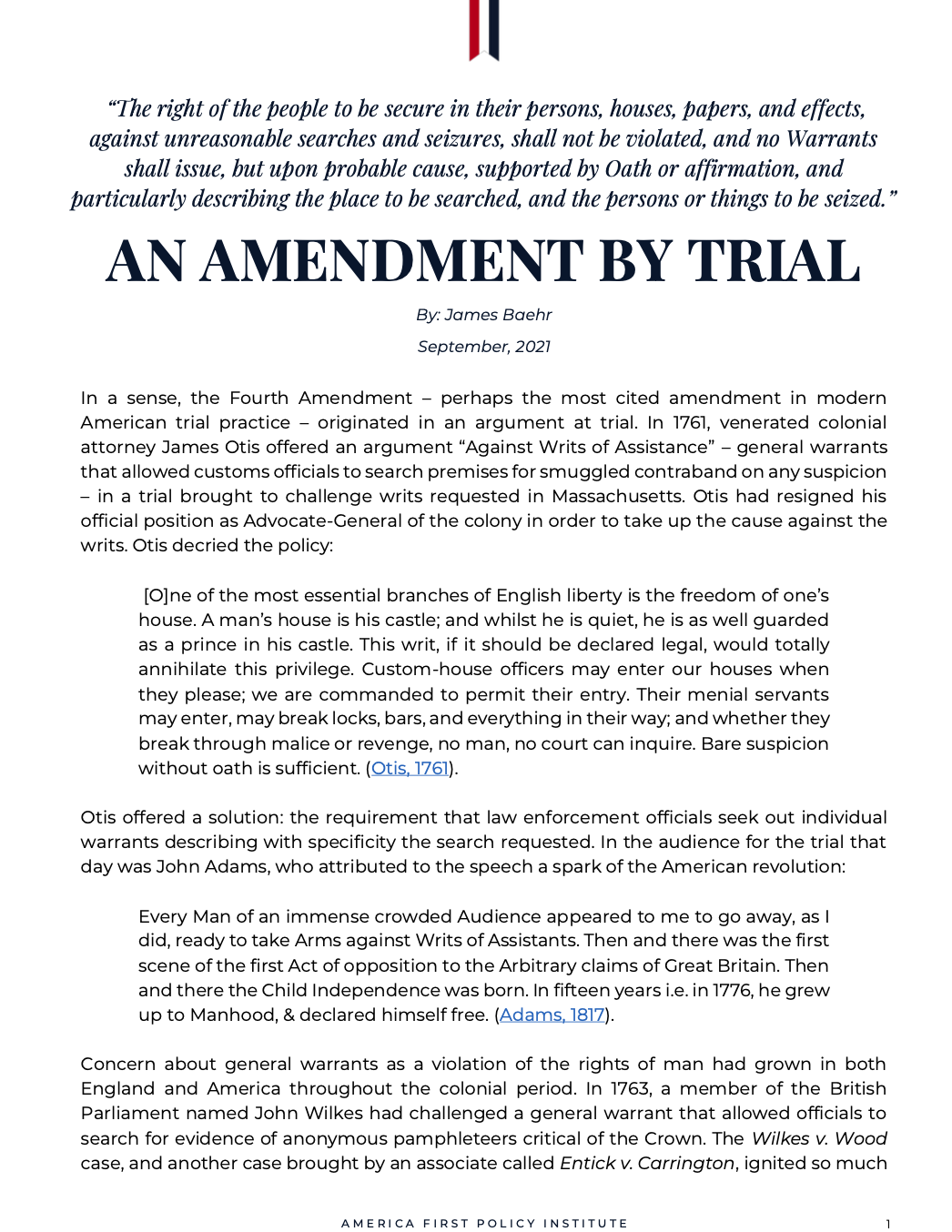An Amendment by Trial
In a sense, the Fourth Amendment – perhaps the most cited amendment in modern
American trial practice – originated in an argument at trial. In 1761, venerated colonial attorney James Otis offered an argument “Against Writs of Assistance” – general warrants that allowed customs officials to search premises for smuggled contraband on any suspicion – in a trial brought to challenge writs requested in Massachusetts. Otis had resigned his official position as Advocate-General of the colony in order to take up the cause against the writs. Otis decried the policy:
[O]ne of the most essential branches of English liberty is the freedom of one’s house. A man’s house is his castle; and whilst he is quiet, he is as well guarded as a prince in his castle. This writ, if it should be declared legal, would totally annihilate this privilege. Custom-house officers may enter our houses when they please; we are commanded to permit their entry. Their menial servants may enter, may break locks, bars, and everything in their way; and whether they break through malice or revenge, no man, no court can inquire. Bare suspicion without oath is sufficient. (Otis, 1761).
Otis offered a solution: the requirement that law enforcement officials seek out individual warrants describing with specificity the search requested. In the audience for the trial that day was John Adams, who attributed to the speech a spark of the American revolution:
Every Man of an immense crowded Audience appeared to me to go away, as I did, ready to take Arms against Writs of Assistants. Then and there was the first scene of the first Act of opposition to the Arbitrary claims of Great Britain. Then and there the Child Independence was born. In fifteen years i.e. in 1776, he grew up to Manhood, & declared himself free. (Adams, 1817).
Concern about general warrants as a violation of the rights of man had grown in both England and America throughout the colonial period. In 1763, a member of the British Parliament named John Wilkes had challenged a general warrant that allowed officials to search for evidence of anonymous pamphleteers critical of the Crown. The Wilkes v. Wood case, and another case brought by an associate called Entick v. Carrington, ignited so much interest across the colonies that the Number 45 (the edition of his newspaper criticizing the King) became associated as a symbol of resistance: the Sons of Liberty purportedly drank 45 toasts to him, and children were named Wilkes and festooned with 45 ribbons. (Mellen, 2015).
By 1780, Adams’ home state of Massachusetts had established its own protection from general warrants along with Virginia and Maryland. (Massachusetts Declaration of Rights, 1780). At the time of the ratification debates over the Constitution, the failure to include a provision protecting people from general warrants led Anti-Federalists to warn about the risk of government encroachment of the home. “Patrick Henry warned that the new Federal Constitution would expose the citizenry to searches and seizures ‘in the most arbitrary manner, without any evidence or reason.’” 3 Debates on the Federal Constitution 588 (J. Elliot 2d ed. 1854). Maryland v. King, 569 U.S. 435 (2013) (J. Scalia, dissenting). In response, the Fourth Amendment was swiftly passed as part of the Bill of Rights without much discussion as to the bounds of the unreasonable search and seizure provision.
What the Fourth Amendment’s clause regarding “unreasonable” search and seizure means has generated significant questions for the Supreme Court in the years since. Questions about the effect of technology on searches – from automobiles, to wiretaps of phone lines, to infrared imaging of houses – have kept courts busy in line-drawing and criminal defense attorneys busy in filing motions. Perhaps the strongest proponent of the protections of the Fourth Amendment against law enforcement overreach was also the Court’s most articulate advocate for interpreting the Constitution based on original meaning, Justice Antonin Scalia. (MacDonnell, 2015). “Solving unsolved crimes is a noble objective, but it occupies a lower place in the American pantheon of noble objectives than the protection of our people from suspicionless law-enforcement searches. The Fourth Amendment must prevail.” Maryland v. King, 569 U.S. 435 (2013) (J. Scalia, dissenting). Scalia’s interpretation of the Fourth Amendment often created disparate alliances on the Court. Even after his death, the Court took an expansive view that the warrant requirement applied even to cellphone location data. Carpenter v. United States, 585 U.S. ___ (2018). Over 260 years later, court efforts to interpret the meaning of an officials’ proper power to conduct searches continues.
A u t h o r B i o g r a p h y
James Baehr is a Senior Fellow of the America First Policy Institute. He is a Major in the Marine Corps Reserve and served as a Special Assistant to the President.
